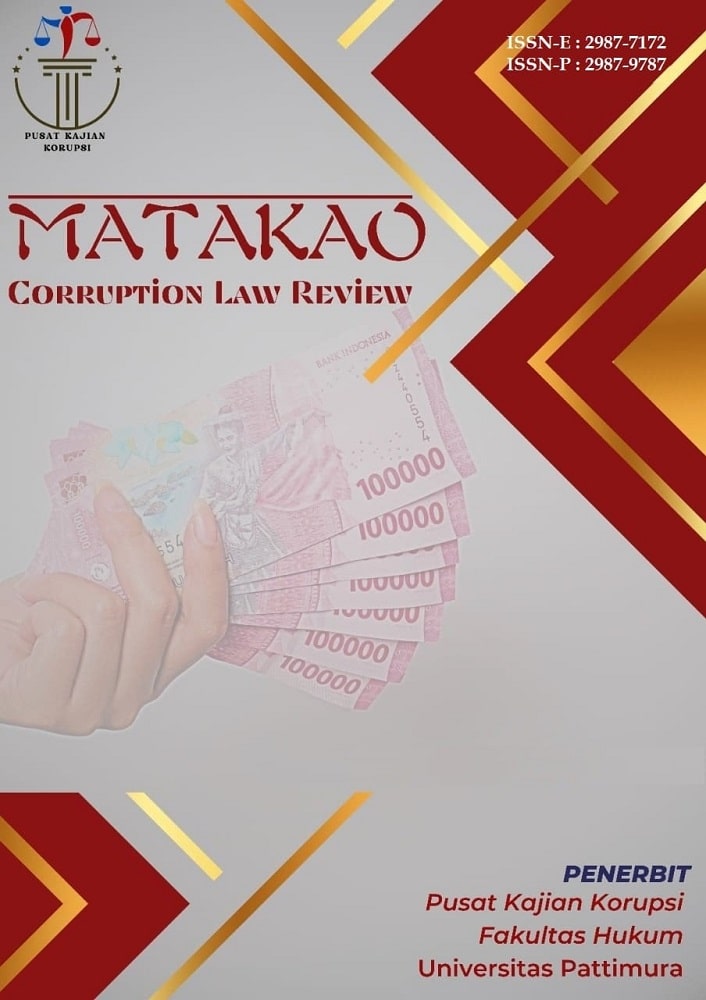Pertimbangan Hukum Hakim Terhadap Pelaku Tindak Pidana Korupsi
Abstract
Introduction: The dilemma in corruption cases, between legal certainty and substantive justice, places the judge's considerations as the main factor in ensuring a fair and effective decision.
Purposes of the Research: This study aims to analyze the legal considerations of judges regarding perpetrators of corruption in decision No. 23/Pid.Sus-TPK/2024/PN Amb, as well as to analyze the imposition of sanctions on perpetratos of corruption from the perspective of the objectives of criminal punishment.
Methods of the Research: The type of research used in this study is normative legal research. The approaches used are the legislative approach, the conceptual approach, and the case approach. The legal sources used are primary, secondary, and tertiary legal materials. The procedure for collecting legal materials is through literature study. The processing and analysis of legal materials use qualitative analysis.
Results of the Research: The research results show that in Decision No. 23/Pid.Sus-TPK/2024/PN Amb, the panel of judges considered that although the subsidiary charges were proven, the defendant's actions were not categorized as a criminal offense because the state losses had been gradually recovered prior to the suspect's indictment, in accordance with the recommendations of the BPK's audit report through administrative mechanisms. Based on these considerations, the defendant was acquitted of all legal charges (onslag van alle rechtsvervolging) without being sentenced to any principal or additional penalties. Further research shows that the imposition of sanctions on perpetrators of corruption is not yet in line with the objectives of criminal punishment. The acquittal indicates that the acts charged were proven but did not constitute a criminal offense, so the defendant could not be punished, which means that the objective of criminal punishment to punish perpetrators of corruption was not achieved.
Downloads
References
Agnes Asisi Maselle Devinta, Pertimbangan Hakim dalam Menjatuhkan Putusan Bebas dalam Perkara Pidana Korupsi, Jurnal Program Studi Ilmu Hukum, Fakultas Hukum Universitas Atma Jaya, Yogyakarta, 2015.
Ahmad Rifai, Penemuan Hukum oleh Hakim dalam Persfektif Hukum Progresif, Jakarta: Sinar Grafika, 2010.
Amir Syamsuddin, Integritas Penegak Hukum, Hakim, Jaksa, Polisi, dan Pengacara, Jakarta: Kompas, 2008.
Anak Agung Gede Budhi Warmana Putra, Simon Nahak, I Nyoman Gede Sugiartha, “Pemidanaan Terhadap Pelaku Tindak Pidana Korupsi Melalui Double Track System”, Jurnal Preferensi Hukum 2, no. 2 (2020).
Barda Nawawi Arief, Bunga Rampai Hukum Pidana, Bandung: Aditya Bhakti, 2011.
Graciella Nathalie Winata, “Tindak Pidana Korupsi: Tantangan dalam Penegakan dan Pencegahannya”, MANDUB: Jurnal Politik, Sosial, Hukum dan Humaniora 2, no. 4 (2024)
Haryadi, “Tinjauan Yuridis Perumusan Sanksi Pidana Bagi Pelaku Tindak Pidana Korupsi Menurut Undang-Undang No. 31 Tahun 1999 Jo. Undang-Undang Nomor 20 Tahun 2001 Dalam Perspektif Tujuan Pemidanaan”, Jurnal Ilmu Hukum Jambi, 2014.
I Ketut Mertha, Efek Jera, Pemiskinan Koruptor, dan Sanksi Pidana, Denpasar: Udayana University Press, 2014.
Inspektorat Jenderal Kementerian Pendidikan, Kebudayaan, Riset, Dan Teknologi Republik Indonesia, Benarkah Budaya Korupsi Indonesia Warisan Belanda?, https://itjen.kemdikbud.go.id/web/benarkah-budaya-korupsi-indonesia-warisan-belanda/.
Jenggis Khan Haikal, Analisis Pertimbangan Hakim Dalam Menjatuhkan Putusan Bebas Terhadap Pelaku Tindak Pidana Penipuan Jual Beli Tanah, Jawa Tengah: Amerta Media, 2023.
Komisi Pemberantasan Korupsi, Memahami Untuk Membasmi: Buku Panduan Untuk Memahami Tindak Pidana Korupsi, Jakarta: KPK, 2006.
Muammar, Iqbal Taufik, “Ambiguitas Norma Pendidikan Antikorupsi di Perguruan Tinggi, Antara Kewajiban dan Kebutuhan”, Peradaban Journal of Law and Society 2, no. 1 (2023).
Muhammad Syafri Bahtra Holle, Sherly Adam, Yanti Amelia Lewerissa, “Pertimbangan Hukum Hakim Dalam Putusan Perkara Tindak Pidana Penganiayaan”, Syntax Literate: Jurnal Ilmiah Indonesia 10, no. 4 (2025).
Nikolas Simanjuntak, Acara Pidana di Indonesia Dalam Sirkus Hukum, Bogor: Ghalia Indonesia, 2009.
Rylke Marviano Taberima, Deasy Jacomina Anthoneta Hehanussa, Sherly Adam, “Perlindungan Hukum Terhadap Justice Collaborator di Indonesia (Analisa Putusan Nomor: 48/Pid.Sus/TPK/2016/PN.Jkt Pst)”, MATAKAO Corruption Law Review 1, no. 2 (2023).
S. R. Sianturi, Azas-Azas Hukum Pidana, Jakarta: Rineka Cipta, 1996.
Copyright (c) 2025 Gloria Christea Andini Indey, Sherly Adam, Muammar Muammar (Author)

This work is licensed under a Creative Commons Attribution-NonCommercial 4.0 International License.
Copyright:
Authors who publish their manuscripts in this Journal agree to the following conditions:
- The copyright in each article belongs to the author, as well as the right to patent.
- Authors are able to enter into separate, additional contractual arrangements for the non-exclusive distribution of the journal's published version of the work (e.g., post it to an institutional repository or publish it in a book), with an acknowledgment of its initial publication in this journal.
- Authors are permitted and encouraged to post their work online (e.g., in institutional repositories or on their website) prior to and during the submission process, as it can lead to productive exchanges, as well as earlier and greater citation of published work.
- Authors have the right to self-archiving of the article (Author Self-Archiving Policy)
Licence : This Journal is disseminated based on the Creative Commons Attribution-NonCommercial 4.0 International license terms. This license allows anyone to copy and redistribute this material in any form or format, compose, modify, and make derivatives of this material for any purpose. You cannot use this material for commercial purposes. You must specify an appropriate name, include a link to the license, and certify that any changes have been made. You can do this in a way that is appropriate, but does not imply that the licensor supports you or your use.

This work is licensed under a Creative Commons Attribution-NonCommercial 4.0 International License..












